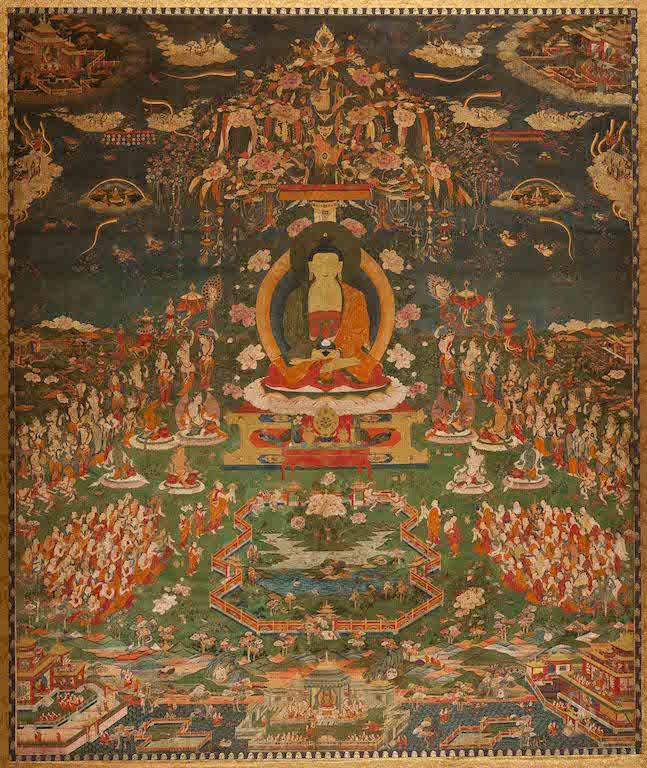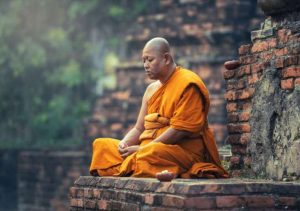
If you have ever felt joyful upon hearing of Amitabha Buddha’s deliverance and admittance to his Pure Land, you are now on the right track as a Pure Land practitioner. Congratulations!
It is stated in Amitabha’s 18th vow that sentient beings must entrust themselves sincerely and joyfully to Amitabha Buddha. According to the Infinite Life Sutra, “All sentient beings who, having heard his Name, rejoice in faith, remember him even once and sincerely transfer the merit of virtuous practices to that land, aspiring to be born there, will attain birth and dwell in the Stage of Non-retrogression.”*
The Contemplation Sutra says, “Seeing the utmost beauty and bliss of that land, [Queen Vaidehi and all sentient beings] will rejoice and immediately attain perseverance in the non-arising of all dharmas.”** Master Shandao, the founder of the Pure Land tradition, indicated that there are three other meanings of “perseverance in the non-arising of all dharmas.” They are perseverance in joy, perseverance in enlightenment, and perseverance in faith.
The bodhisattva Nagarjuna also used the analogy of the joy of sailing on a boat to describe the feeling of a genuine Pure Land practitioner’s journey to the Pure Land. If you are unable to grasp the essence of the Pure Land teachings, you are said to be walking to your destination uphill, with difficulty and pain.
Joy is a good and positive indicator that you believe in and accept the deliverance of Amitabha Buddha in the right way, one of the objectives of Pure Land Buddhism. It is a kind of joy from the bottom of one’s heart, like survival at a critical and desperate moment.
Why are the practitioners joyful?
1. They know that they are the objects of “salvation,” thus qualified to be reborn in the Land of Bliss, Amitabha Buddha’s homeland. Some Pure Land practitioners have doubts about whether they are entitled to be admitted to the Land of Bliss, the unconditioned realm of nirvana. They doubt that an iniquitous ordinary being can be reborn there until his kleshas (mental defilements) have been eliminated.
If a Pure Land practitioner has the question “What should I do to qualify for rebirth in the Land of Bliss?” in his mind, he will surely be depressed and desperate. However, if he believes or knows that Amitabha Buddha is waiting for him and the door is always open, he will undoubtedly be excited.
2. They know that they are assured of rebirth in this lifetime, and they will no longer reincarnate within the Six Realms. They will not be dragged about by the force of karma near the end of their lives. The uncertainty of rebirth in the Land of Bliss has been eliminated.
A Pure Land practitioner will be concerned about whether he will be able to call upon Amitabha Buddha to receive him when nearing death. He knows he has no control over his rebirth himself, so his rebirth is uncertain. However, if he believes or knows his rebirth is entirely dependent on the awesome power of the mighty Amitabha Buddha, his rebirth is assured and he will be relieved.
3. They know that they can concentrate on a simple practice, because exclusive Amitabha-recitation will ensure their rebirth. The merits and virtues of various meditative and non-meditative virtues are not directly related to rebirth. The anxiety of trying to attain rebirth in the Pure Land is eradicated.
A Pure Land practitioner would find it stressful to do a lot of miscellaneous virtuous practice at a certain level for the sake of rebirth in the Land of Bliss. However, if he believes or knows his rebirth depends merely on the assured karma of Amitabha-recitation, his mind will be settled. This might be the only practice that he can easily do at all times and under any circumstances, and he can therefore relax.
A Pure Land practitioner can have the same feeling of joy as Queen Vaidehi if he attempts to learn the Pure Land teachings from Amitabha’s perspective and trusts and relies entirely on the merits and virtues of Amitabha’s name, developing deep faith through exclusive Amitabha-recitation.
Last month, I received an email from an American living in Norway. He wrote: “The last eight months, in which I have been seriously practicing in the Shandao tradition, have been a profound blessing; I truly feel as if Amitabha has settled my faith once and for all. Sometimes I am able to practice more, sometimes not, but I know that I am held in Amitabha’s Light and saved by Amitabha’s Vow regardless.”
He took Refuge in the Three Treasures in 2008 and joined the Jodo Shinshu sect of Japanese Pure Land. He continued: “Many years of frustration followed as I was drawn into the teaching of Jodo Shinshu. Jodo Shinshu teaches that one’s birth in the true Pure Land is not settled until one realizes a mind free of doubt and anxiety about one’s birth. One can only realize this mind through listening to the teaching. I read, studied, listened to countless dharma talks and said many, many nembutsu [recitations of Amitabha’s name], all the while desperately hoping to realize the mind free of doubt. After some years, despite my initial commitment to the sect, I left in despair and began practicing in the tradition of Honen Shonin [the follower of Master Shandao, who founded the Pure Land school in Japan]. There I found greater peace of mind.”
He went on: “It wasn’t until I found the teachings of Master Huijing [who propagates the Shandao tradition of Pure Land in Taipei] that all my fears began to melt away like frost in the morning light. Reading Master’s dharma talks, I began to realize how much Amitabha cares for me. Birth in the Pure Land was not something to worry and fret over; it is, in fact, EASY! The joy I experienced at this revelation is difficult to describe. Though I still sometimes have occasional moments of doubt or worry, I now know that my rebirth is guaranteed by the power of Amitabha’s Vow. When I think of this, my heart begins to dance and the nian-fo [Amitabha-recitation] flows from my lips! Even in darkness and difficulty, an echo of this joy is always with me.”
This is the kind of perseverance in joy that we have just discussed.
*Translation by Hisao Inagaki**Adapted from a translation by Hisao Inagaki











